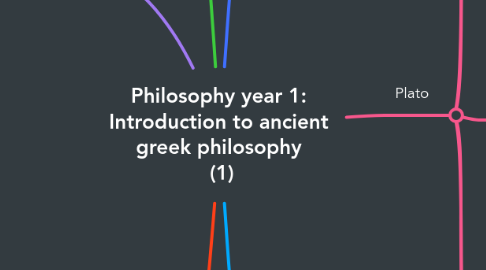
1. Metaphysics: Deals with the first principles of abstract concepts
1.1. Epistemology: The theory of knowledge
1.2. A Priori: Knowledge is obtained by analysing concepts independent of experience
1.3. A Posterior: Knowledge is obtained through experience
1.4. The blind men and the elephant
2. Aristotle
2.1. Empiricist
2.1.1. knowledge is gained by sense experience
2.1.1.1. A Posterior
2.1.1.2. Tabula rasa
2.2. Telos
2.2.1. Purpose
2.2.1.1. the efficiency to fulfil telos determines goodness
2.3. Nature of the universe
2.3.1. Imperfect
2.3.2. Mutable
2.3.3. Transient
2.3.4. Potential to actuality
2.4. The four causes
2.4.1. 1) Material Cause: this refers to the substance that something is made from
2.4.2. 2) Formal Cause: this refers to what gives matter its structure
2.4.3. 3) Efficient Cause: this refers to the cause of an object or thing existing
2.4.4. 4) Final Cause: this is concerned with the reasons why something is the way it is
2.4.4.1. Telos
2.4.5. = Essence
2.4.6. The four causes can be applied to things that exist within the world as a way of explaining them.
2.4.7. Rely on experience. this is unreliable because experience changes from person to person
2.5. The prime mover
2.5.1. The final cause
2.5.2. uncaused = resolves infinite regression
2.5.3. outside our world in terms of time and space
2.5.4. eternal ♾️
2.5.5. transcendent
2.5.6. necessary
2.5.7. creatio ex nihilo - nothing existed before God
2.5.8. produces motion by being loved
2.5.9. 'divine thought' thinks - most excellence of things
2.5.10. The relationship between the Prime Mover and the universe is unclear.
2.6. How convincing is Aristotle’s idea of the Prime Mover? 40 marks
3. Evaluation
3.1. Plato
3.1.1. One over many argument
3.2. Counter plato
3.2.1. Nominalists
3.2.1.1. occam's razor
3.2.2. Locke
3.2.2.1. idea of general representation of different things
3.2.3. Hume
3.2.3.1. one experience represents similar experiences
3.2.4. Wittgenstein
3.2.4.1. overlapping characteristics
3.3. Aristotle
3.3.1. The four causes
3.3.1.1. Prime mover
3.3.2. Not all natrual things have a purpose
3.3.2.1. male nipples, appendix
3.3.2.2. Natural process -> natural matter in a particluar form
3.3.2.2.1. nipple forming process
3.4. Counter Aristotle
3.4.1. Albert camus
3.4.1.1. universe is chaotic
3.4.1.1.1. Aristotle: human mouths produce arranged teeth so how is it chaotic
3.4.1.2. no objective purpose of things
3.4.2. Bertand Russell
3.4.2.1. Universe is just there and that is it
3.4.3. Hume
3.4.3.1. fallacy of composition
3.4.3.1.1. wrong to say the whole universe has a final cuase
3.4.3.2. copy principle
3.4.3.2.1. cannot observe causation
3.4.3.2.2. all simple ideas are copies of impressions
4. Introduction to Ancient Greek Philosophy
4.1. Eudaimonia (virtue): Moral excellence
4.2. "Socratic method"
4.2.1. Asking and answering questions to stimulate critical thinking
4.3. The Carpet Analogy
4.3.1. Philosophical truths, “bumps in your carpet”. It may be possible to smooth them out to some degree but its likely to throw up issues elsewhere.
4.4. Euthyphro dilemma
4.4.1. Is that which is morally good, good, because God commands it
4.4.1.1. Morality is down to God
4.4.2. Does God command it because it is morally good
4.4.2.1. Morality over and above God
4.4.2.1.1. Limits omnipotence
4.5. ‘There is no knowledge so certain that no one can doubt it’ to what extent do you believe that this view is correct? (40 marks)
5. Plato
5.1. Rationalism
5.1.1. Mind is given authority over the senses and reason alone can be used to establish truth.
5.1.2. innate understanding of absolute beauty and goodness
5.1.2.1. recalling truths from within - experiences trigger them
5.1.2.2. Story of Meno
5.1.2.3. Pre-existence
5.1.2.3.1. Realm of forms
5.1.2.3.2. Dualist
5.2. Knowledge is also about use.
5.3. Theory of forms
5.3.1. The realm of the forms
5.3.1.1. Ultimate blueprint for all things
5.3.1.1.1. Form of the good
5.3.1.2. Truth
5.3.1.3. Wittgenstein rejected the one over many argument with his family resemblance theory. He suggested that there is no ‘one over many’ but merely a series of overlapping characteristics.
5.3.2. Physical world: World of the particulars
5.3.2.1. ever-changing = never the objects of completely true knowledge
5.3.2.1.1. Imperfect
5.3.2.2. Participate in the forms
5.3.2.2.1. One over many argument- able to recognise things that are different but the same (e.g. dogs)
5.3.2.2.2. helps us to understand why there are imperfections in the world
5.3.2.2.3. there is no real empirical evidence for its existence.
5.3.2.2.4. there is no such absolute value as ‘good’ as it is subjective
5.3.2.3. Illusion
5.4. ‘Plato’s form of the Good is not real’ – Discuss. 40 marks.
5.5. Allegory of the cave
5.5.1. Three prisoners, they cannot look at anything but the stonewall in front of them, and behind them is a fire
5.5.1.1. They can see shadows of things going past
5.5.1.1.1. If you had never seen the real objects ever before, you would believe that the shadows of objects were “real
5.5.2. Prisoners create a "game" guessing what comes next
5.5.2.1. Guess correctly = master of nature.
5.5.3. Prisoner escapes
5.5.3.1. he realises that his former view of reality was wrong.
5.5.3.1.1. his former life, and the guessing game they played is useless.
5.5.4. Prisoner returns
5.5.4.1. The other prisoners do not believe him and threaten to kill him if he tries to set them free
5.5.5. Cave = empirical world
5.5.5.1. Fire = sun
5.5.5.1.1. Shadows = particulars
5.5.6. Absolutist
5.5.7. Evaluate Plato’s purpose for the analogy of the cave. 40 marks.
6. Comparison
6.1. Aristotle
6.1.1. produces motion by being loved
6.1.2. thought
6.1.3. most actual
6.2. Both
6.2.1. transient
6.2.1.1. immutable
6.2.2. perfect
6.2.3. Incorruptible
6.2.4. eternal
6.2.5. inmaterial
6.3. Plato
6.3.1. reveals rational soul to the truth
6.3.2. idea
6.3.3. most real
